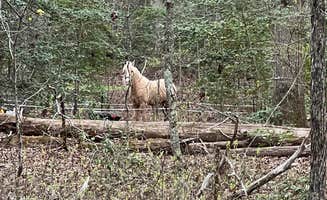Equestrian camping opportunities near Dunkirk, Maryland remain limited, with most regional campgrounds lacking dedicated horse facilities. The area sits in Maryland's coastal plain at elevations under 200 feet, creating relatively flat terrain punctuated by gentle hills and stream valleys. Summer temperatures average 85-90°F with high humidity, while spring and fall provide milder conditions in the 60-75°F range that attract most horse riders and campers to the region.
What to do
Trail riding at Cedarville State Forest: The forest has designated equestrian trails accessible from the campground area, though riders should bring water for horses as facilities are minimal. "We stayed one night in Cedarville State Forest. Equestrian trails go deep into the woods if you want a longer trail," notes Ben J. from Cedarville State Forest.
Disc golf courses: Several parks offer disc golf as an alternative activity when not riding. "I'd recommend taking in a game of disc golf on their 18 hole course," suggests Rachel L. who visits Pohick Bay Campground regularly.
Wildlife observation: The forested areas provide opportunities for spotting native wildlife during early morning or evening rides. "Saw a snake, alligator snapping turtle, and rabbits, before we even reached the gates," reports one visitor to Cedarville State Forest.
Water activities near horse trails: Some parks offer water access for cooling off after riding. "Boating in summer from kayaks to motorboats" is available at Pohick Bay according to Anne K., making it a good option for horse owners who also enjoy water activities.
What campers like
Space between sites: Campers appreciate parks that offer adequate separation between camping areas. At Tuckahoe State Park Campground, "Spacious, wooded sites" with "lots of shade and trees on large sites and space between sites make this a pleasant campground," according to Mary S.
Clean facilities: Well-maintained bathrooms rank highly among horse campers who need reliable facilities. "The bathhouse is very clean," reports Jessica K. about Tuckahoe State Park, which matters particularly for equestrians after a day of riding.
Relative seclusion: Despite proximity to urban areas, some campgrounds offer surprising quiet. "It's super close to home and I love the small feel to it. People keep to themselves and you feel kinda like your by yourself even though the park is usually full," writes Dean G. about Tuckahoe State Park.
Natural setting: Forested campsites provide shade and a natural environment for horses and humans alike. "Very well maintained, nice sites that aren't right on top of one another," notes Donald G. about the camping loops at Cedarville State Forest.
What you should know
Tick prevention essential: Ticks are extremely common in horse camping areas near Dunkirk. "LOTS and LOTS of ticks. I got one, but my wife and dog got about a dozen each. Just bring tweezers," warns one Cedarville State Forest camper.
Limited horse-specific amenities: While some parks allow horses on trails, dedicated equestrian facilities are sparse. At Bull Run Regional Park, there are "miles of trails" but no specific horse corrals or facilities at the campsites themselves.
Seasonal considerations: Many campgrounds operate on limited schedules. Tuckahoe State Park is only open "March 25 to November 27," according to park information, making advance planning crucial for horse campers.
Noise factors: Despite natural settings, some campgrounds experience noise pollution. One Bull Run visitor notes, "There is a shooting range in the park. It is on a flight path for DCA. And, I66 is not that far away," which may affect horses sensitive to loud sounds.
Tips for camping with families
Playground access: For families bringing both children and horses, look for parks with play areas. At Martinak State Park Campground, "They have quite a few playgrounds throughout the park, which was a major plus for us," mentions Bill F.
Educational opportunities: Some parks offer learning activities suitable for children. "If you're looking to learn and explore with your kids, there is an extensive junior ranger program" at Martinak State Park and its sister park Tuckahoe, notes Jean C.
Organized activities: Family-focused campgrounds often provide structured activities. "They had a scavenger hunt for the kids going all weekend, they had an outdoor movie scheduled for Friday night, a campfire story time scheduled for Saturday night and crafts scheduled for Sunday morning," shares one visitor to Pohick Bay.
Shower facilities: When camping with horses and kids, clean showers become essential. "Bath houses are kept clean," reports Bill F. about Martinak State Park, making it easier to manage after dusty trail rides.
Tips from RVers
Site selection for horse trailers: RVers pulling horse trailers need to carefully select appropriate sites. "Our site had a slight slope, but was easily overcome using additional blocks on the low side to get the trailer level," notes Drew M. about Bull Run Regional Park.
Electric hookups: For horse campers with living quarters trailers, electrical access is important. Cedarville State Forest offers "electric hookups" but visitors should note they're limited to "30-amp hookups" without 50-amp service available.
Dump station quality: After extended stays with horses, functional dump stations become important. "They have a new dump station, but the hose has an anti-freeze up in the air with a pull cord valve. This means every time you pull to turn the water on, you get a shower," warns one camper about Cedarville's facilities.
Water access points: Horse owners need reliable water for their animals. At Tuckahoe, "there are spigots on the loops with potable water" that can serve both campers and horses when appropriate containers are brought.


